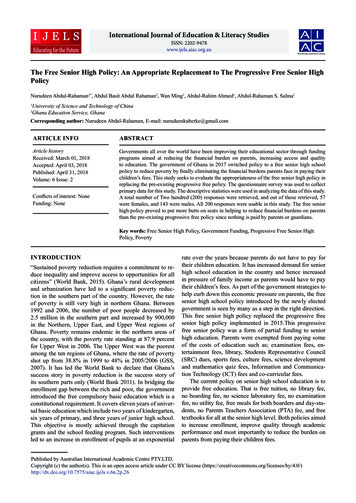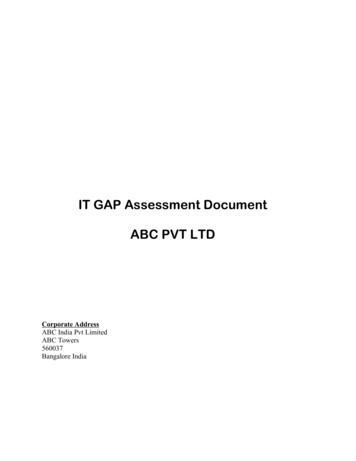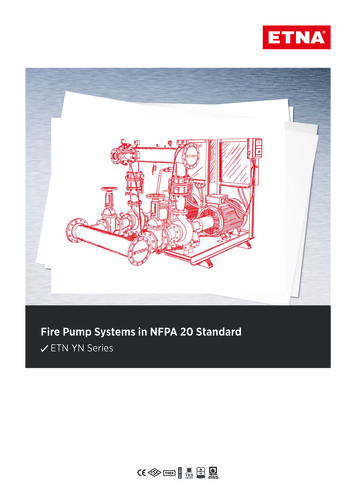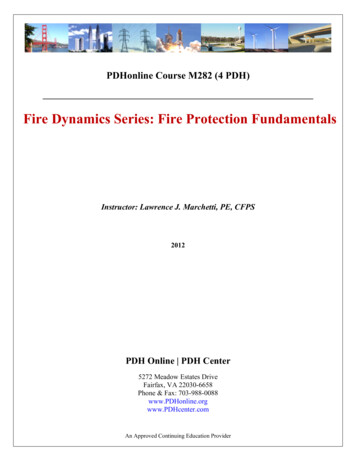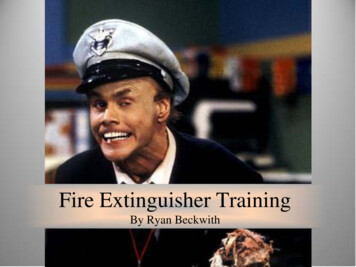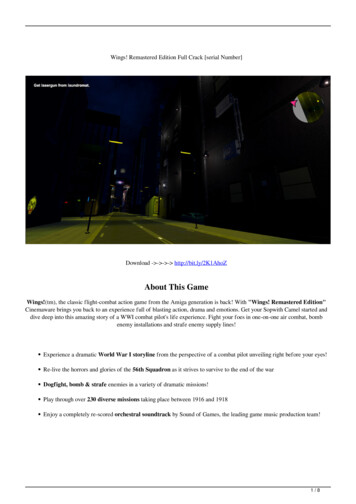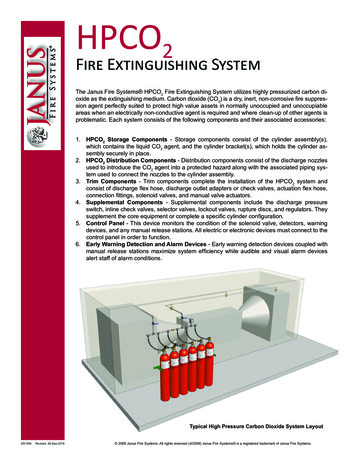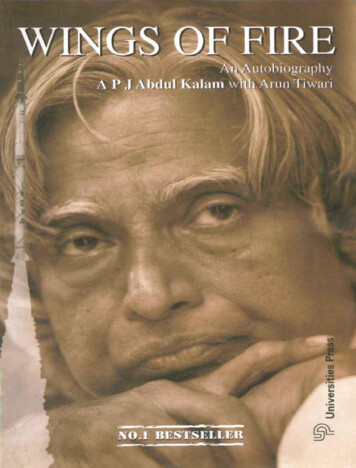
Transcription
WINGS OF FIREAn AutobiographyAVUL PAKIR JAINULABDEEN ABDUL KALAM hascome to personally represent to many of his countrymen thebest aspects of Indian life. Born in 1931, the son of a littleeducated boatowner in Rameswaram, Tamilnadu, he hadan unparalleled career as a defence scientist, culminatingin the highest civilian award of India, the Bharat Ratna.As chief of the country’s defence research anddevelopment programme, Kalam demonstrated the greatpotential for dynamism and innovation that existed inseemingly moribund research establishments. This is thestory of Kalam’s rise from obscurity and his personal andprofessional struggles, as well as the story of Agni, Prithvi,Akash, Trishul a nd Nag - missiles that have becomehousehold names in India and that have raised the nation tothe level of a missile power of international recokoning.At the same time as he has helped create India’sawesome weaponry, Kalam has maintained the asceticrigour of his personal life, working 18 hours a day andpracticing the veena. With characteristic modesty, Kalamascribes the greatness of his achievement to the influenceof his teachers and mentors. He describes the struggles ofhis boyhood and youth, bringing alive everyday life in asmall town in South India and the inspirational role ofeducators. He describes the role of visionary Indianscientists, such as Dr Vikram Sarabhai, and of the creationof a coordinated network of research institutions. This isalso the saga of independent India’s struggle fortechnological self sufficiency and defensive autonomy – astory as much about politics, domestic and international, asit is about science.Arun Tiwari worked under Dr APJ Abdul Kalam forover a decade in the Defence Research and DevelopmentLaboratory (DRDL), Hyderabad. He is currently Director,Cardiovascular Technology Institute, Hyderabad, where heis pursuing Dr Kalam’s vision of developing cost-effectivemedical devices using indigenous defence technology.Dr Kalam is now India’s President. He was elected toIndia’s office by a huge majority in 2002.To the memory of my parentsMy MotherSea waves, golden sand, pilgrims’ faith,Rameswaram Mosque Street, all merge into one,My Mother!You come to me like heaven’s caring arms.I remember the war days when life was challenge and toil—Miles to walk, hours before sunrise,Walking to take lessons from the saintly teacher near thetemple. Again miles to the Arab teaching school,Climb sandy hills to Railway Station Road,Collect, distribute newspapers to temple city citizens,Few hours after sunrise, going to school.Evening, business time before study at night.All this pain of a young boy,My Mother you transformed into pious strengthWith kneeling and bowing five times
For the Grace of the Almighty only, My Mother.Your strong piety is your children’s strength,You always shared your best with whoever needed themost, You always gave, and gave with faith in Him.I still remember the day when I was ten,Sleeping on your lap to the envy of my elder brothers andsisters It was full moon night, my world only you knewMother! My Mother!When at midnight I woke with tears falling on my knee Youknew the pain of your child, My Mother.Your caring hands, tenderly removing the painYour love, your care, your faith gave me strengthTo face the world without fear and with His strength.We will meet again on the great Judgement Day, MyMother!APJ Abdul KalamContentsPrefaceAcknowledgements IntroductionORIENTATIONCREATIONPROPITIATION CONTEMPLATION EpiloguePrefaceIhave worked under Dr APJ Abdul Kalam for over adecade. This might seem to disqualify me as hisbiographer, and I certainly had no notion of being one. Oneday, while speaking to him, Iasked him if he had a message for young Indians. Hismessage fascinated me. Later, I mustered the courage toask him about his recollections so that I could pen themdown before they were buried irretrievably under the sandsof time.We had a long series of sittings late into the night andearly under the fading stars of dawn—all somehow stolenfrom his very busy schedule of eighteen hours a day. Theprofundity and range of his ideas mesmerized me. He hadtremendous vitality and obviously received immensepleasure from the world of ideas. His conversation was notalways easy to follow, but was always fresh and stimulating.There were complexities, subtleties, and intriguingmetaphors and subplots in his narrative, but gradually theunfolding of his brilliant mind took the form of a continuousdiscourse.When I sat down to write this book, I felt that it requiredgreater skills than I possessed. But realising theimportance of this task and regarding it an honour to havebeen permitted to attempt it, I prayed earnestly for thecourage and calibre to complete it.This book is written for the ordinary people of India forwhom Dr Kalam has an immense affection, and of whomDr Kalam is certainly one. He has an intuitive rapport withthe humblest and simplest people, an indication of his ownsimplicity and innate spirituality.For myself, writing this book has been like a pilgrimage.Through Dr Kalam, I was blessed with the revelation thatthe real joy of living can be found in only one way—in one’scommunion with an eternal source of hidden knowledgewithin oneself—which each individual is bidden to seek andfind for himself or herself. Many of you may never meet DrKalam in person, but I hope you will enjoy his companythrough this book, and that he will become your spiritualfriend.I could include in this book only a few incidents amongthe many narrated to me by Dr Kalam. In fact, this book
provides only a thumbnail sketch of Dr Kalam’s life. It isquite possible that certain important incidents have beeninadvertently dropped and that the contribution of someindividuals to the projects co-ordinated by Dr Kalam hasgone unrecorded. Since a quarter-century of professionallife separates me from Dr Kalam, some important issuesmight also have remained unrecorded or have beendistorted. I am solely responsible for such shortcomings,which are, of course, completely unintentional.Arun TiwariAcknowledgements IntroductionIwish to express my gratitude to all the people involvedin the writing of this book, especially Mr YS Rajan, Mr ASivathanu Pillai, Mr RN Agarwal, Mr Prahlada, Mr KVSSPrasada Raoand Dr SK Salwan, who were very generous in sharing theirtime and knowledge with me.I am thankful to Prof. KAV Pandalai and Mr RSwaminathan, for critical reviews of the text. I thank Dr BSoma Raju for his tangible, but always unspoken support,for this project. My sincere thanks go to my wife andunsparing critic, Dr Anjana Tiwari, for her tough comments,accompanied with her gentle support.It has been a pleasure to work with Universities Press, andthe cooperation of the editorial and production staff is muchappreciated.There are many fine people, such as the photographerMr. Prabhu, who have selflessly enriched me and this bookin ways beyond measure. I thank them all.And finally, my deepest gratitude to my sons, Aseemand Amol— for their unfailing emotional support during thewriting, and because I seek in them that attitude towardslife which Dr Kalam admired, and wanted this work toreflect.Arun TiwariThis book is being released at a time when India’stechnological endeavours, to assert its sovereignty andstrengthen its security, are questioned by many in the world.Historically, people have always fought among themselveson one issue or another. Prehistorically, battles were foughtover food and shelter. With the passage of time, wars werewaged over religious and ideological beliefs; and now thedominant struggle of sophisticated warfare is for economicand technological supremacy. Consequently, economicand technological supremacy is equated with politicalpower and world control.Afew nations who have grown very strongtechnologically, over the past few centuries, have wrestedcontrol, for their own purposes. These major powers havebecome the self-proclaimed leaders of the new worldorder. What does a country of one billion people, like India,do in such a situation? We have no other option but to betechnologically strong. But, can India be a leader in the fieldof technology? My answer is an emphatic ‘Yes’. And let mevalidate my answer by narrating some incidents from mylife.When I first began the reminiscences that have goneinto this book, I was uncertain about which of my memorieswere worth narrating or were of any relevance at all. Mychildhood is precious to me, but would it be of interest toanyone else? Was it worth the reader’s while, I wondered,to know about the tribulations and triumphs of a smalltownboy? Of the straitened circumstances of my schooldays, theodd jobs I did to pay my school fees, and how my decisionto become a vegetarian was partly due to my financial
constraints as a college student—why should these be ofany interest to the general public? In the end, I wasconvinced that these were relevant, if not for anything elsebut because they tell something of the story of modernIndia, as individual destiny and the social matrix in which itis embedded cannot be seen in isolation. Having beenpersuaded of this, it did seem germane to include theaccounts of my frustrated attempt to become an Air Forcepilot and of how I became, instead of the Collector myfather dreamed I would be, a rocket engineer.Finally, I decided to describe the individuals who had aprofound influence on my life. This book is also by way of asubmission of thanks, therefore, to my parents andimmediate family, and to the teachers and preceptors I wasfortunate to have had, both as a student and in myprofessional life. It is also a tribute to the unflaggingenthusiasm and efforts of my young colleagues who helpedto realise our collective dreams. The famous words of IsaacNewton about standing on the shoulders of giants are validfor every scientist and I certainly owe a great debt ofknowledge and inspiration to the distinguished lineage ofIndian scientists, that included Vikram Sarabhai, SatishDhawan and Brahm Prakash. They played major roles inmy life and in the story of Indian science.I completed sixty years of age on 15 October 1991. I haddecided to devote my retirement to fulfilling what I saw asmy duties in thesphere of social service. Instead, two things happenedsimultaneously. First, I agreed to continue in governmentservice for another three years and, next, a youngcolleague, Arun Tiwari, requested me to share myreminiscences with him, so that he could record them. Hewas someone who had been working in my laboratorysince 1982, but I had never really known him well until theFebruary of 1987 when I visited him at the IntensiveCoronary Care Unit of the Nizam’s Institute of MedicalSciences in Hyderabad. He was a mere 32 years old, butwas fighting valiantly for his life. I asked him if there wasanything he wanted me to do for him. “Give me yourblessings, sir,” he said, “so that I may have a longer life andcan complete at least one of your projects.”The young man’s dedication moved me and I prayed forhis recovery all night. The Lord answered my prayers andTiwari was able to get back to work in a month. He did anexcellent job in helping to realise the Akash missileairframe from scratch within the short space of three years.He then took up the task of chronicling my story. Over thelast year, he patiently transcribed the bits and pieces of mystory and converted them into a fluent narrative. He alsowent through my personal library meticulously and selectedfrom among the pieces of poetry those that I had markedwhile reading, and included them in the text.This story is an account, I hope, not just of my personaltriumphs and tribulations but of the successes andsetbacks of the science establishment in modern India,struggling to establish itself in the technological forefront. Itis the story of national aspiration and of cooperativeendeavour. And, as I see it, the saga of India’s search forscientific self-sufficiency and technological competence isa parable for our times.Each individual creature on this beautiful planet iscreated by God to fulfil a particular role. Whatever I haveachieved in life is through His help, and an expression ofHis will. He showered His grace on me through someoutstanding teachers and colleagues, and when I pay my
tributes to these fine persons, I am merely praising Hisglory. All these rockets and missiles are His work through asmall person called Kalam, in order to tell the severalmillion mass of India, to never feel small or helpless. Weare all born with a divine fire in us. Our efforts should be togive wings to this fire and fill the world with the glow of itsgoodness.May God bless you!APJ Abdul Kalam
IORIENTATION[ 1931 – 1963 ]This earth is His, to Him belong those vast and boundlessskies;Both seas within Him rest, and yet in that small poolHe lies.ATHARVAVEDA Book 4, Hymn 16.
1Iwas born into a middle-class Tamil family in the islandtown of Rameswaram in the erstwhile Madras state. Myfather, Jainulabdeen, had neither much formal educationnor much wealth;despite these disadvantages, he possessed greatinnate wisdom and a true generosity of spirit. He had anideal helpmate in my mother, Ashiamma. I do not recall theexact number of people she fed every day, but I am quitecertain that far more outsiders ate with us than all themembers of our own family put together.My parents were widely regarded as an ideal couple.My mother’s lineage was the more distinguished, one ofher forebears having been bestowed the title of ‘Bahadur’by the British.I was one of many children—a short boy with ratherundistinguished looks, born to tall and handsome parents.We lived in our ancestral house, which was built in themiddle of the 19th century. It was a fairly large pucca house,made of limestone and brick, on the Mosque Street inRameswaram. My austere father used to avoid allinessential comforts and luxuries. However, all necessitieswere provided for, in terms of food, medicine or clothes. Infact, I would say mine was a very secure childhood, bothmaterially and emotionally.I normally ate with my mother, sitting on the floor of thekitchen. She would place a banana leaf before me, onwhich she then ladled rice and aromatic sambhar, a varietyof sharp, home-made pickles and a dollop of fresh coconutchutney.The famous Shiva temple, which made Rameswaramso sacred to pilgrims, was about a ten-minute walk fromour house. Our locality was predominantly Muslim, but therewere quite a few Hindu families too, living amicably withtheir Muslim neighbours. There was a very old mosque inour locality where my father would take me for eveningprayers. I had not the faintest idea of the meaning of theArabic prayers chanted, but I was totally convinced that theyreached God. When my father came out of the mosqueafter the prayers, people of different religions would besitting outside, waiting for him. Many of them offered bowlsof water to my father who would dip his fingertips in themand say a prayer. This water was then carried home forinvalids. I also remember people visiting our home to offerthanks after being cured. My father always smiled andasked them to thank Allah, the benevolent and merciful.The high priest of Rameswaram temple, PakshiLakshmana Sastry, was a very close friend of my father’s.One of the most vivid memories of my early childhood is ofthe two men, each in his traditional attire, discussingspiritual matters. When I was old enough to ask questions, Iasked my father about the relevance of prayer. My fathertold me there was nothing mysterious about prayer. Rather,prayer made possible a communion of the spirit betweenpeople. “When you pray,” he said, “you transcend your bodyand become a part of the cosmos, which knows no divisionof wealth, age, caste, or creed.”My father could convey complex spiritual concepts invery simple, downto-earth Tamil. He once told me, “In hisown time, in his own place, in what he really is, and in thestage he has reached—good or bad—every human beingis a specific element within the whole of the manifest divine
Being. So why be afraid of difficulties, sufferings andproblems? When troubles come, try to understand therelevance of your sufferings. Adversity always presentsopportunities for introspection.”“Why don’t you say this to the people who come to youfor help and advice?” I asked my father. He put his handson my shoulders and looked straight into my eyes. For quitesome time he said nothing, as if he was judging mycapacity to comprehend his words. Then he answered in alow, deep voice. His answer filled me with a strange energyand enthusiasm:Whenever human beings find themselves alone, as anatural reaction, they start looking for company. Wheneverthey are in trouble, they look for someone to help them.Whenever they reach an impasse, they look to someone toshow them the way out. Every recurrent anguish, longing,and desire finds its own special helper. For the people whocome to me in distress, I am but a go-between in their effortto propitiate demonic forces with prayers and offerings.This is not a correct approach at all and should never befollowed. One must understand the difference between afear-ridden vision of destiny and the vision that enables usto seek the enemy of fulfilment within ourselves.I remember my father starting his day at 4 a.m. byreading the namaz before dawn. After the namaz, he usedto walk down to a small coconut grove we owned, about 4miles from our home. He would return, with about a dozencoconuts tied together thrown over his shoulder, and onlythen would he have his breakfast. This remained his routineeven when he was in his late sixties.I have throughout my life tried to emulate my father in myown world of science and technology. I have endeavouredto understand the fundamental truths revealed to me by myfather, and feel convinced that there exists a divine powerthat can lift one up from confusion, misery, melancholy andfailure, and guide one to one’s true place. And once anindividual severs his emotional and physical bondage, he ison the road to freedom, happiness and peace of mind.I was about six years old when my father embarked onthe project of building a wooden sailboat to take pilgrimsfrom Rameswaram to Dhanuskodi, (also calledSethukkarai), and back. He worked at building the boat onthe seashore, with the help of a relative, Ahmed Jallaluddin,who later married my sister, Zohara. I watched the boattake shape. The wooden hull and bulkheads wereseasoned with the heat from wood fires. My father wasdoing good business with the boat when, one day, acyclone bringing winds of over 100 miles per hour carriedaway our boat, along with some of the landmass ofSethukkarai. The Pamban Bridge collapsed with a train fullof passengers on it. Until then, I had only seen the beauty ofthe sea, now its uncontrollable energy came as a revelationto me.By the time the boat met its untimely end, AhmedJallaluddin had become a close friend of mine, despite thedifference in our ages. He was about 15 years older than Iand used to call me Azad. We used to go for long walkstogether every evening. As we started from Mosque Streetand made our way towards the sandy shores of the island,Jallaluddin and I talked mainly of spiritual matters. Theatmosphere of Rameswaram, with its flocking pilgrims, wasconducive to such discussion. Our first halt would be at theimposing temple of Lord Shiva. Circling around the templewith the same reverence as any pilgrim from a distant partof the country, we felt a flow of energy pass through us.Jallaluddin would talk about God as if he had a working
partnership with Him. He would present all his doubts toGod as if He were standing nearby to dispose of them. Iwould stare at Jallaluddin and then look towards the largegroups of pilgrims around the temple, taking holy dips in thesea, performing rituals and reciting prayers with a sense ofrespect towards the same Unknown, whom we treat as theformless Almighty. I never doubted that the prayers in thetemple reached the same destination as the ones offeredin our mosque. I only wondered whether Jallaluddin had anyother special connection to God. Jallaluddin’s schoolinghad been limited, principally because of his family’sstraitened circumstances. This may have been the reasonwhy he always encouraged me to excel in my studies andenjoyed my success vicariously. Never did I find theslightest trace of resentment in Jallaluddin for hisdeprivation. Rather, he was always full of gratitude forwhatever life had chosen to give him.Incidentally, at the time I speak of, he was the onlyperson on the entire island who could write English. Hewrote letters for almost anybody in need, be they letters ofapplication or otherwise. Nobody of my acquaintance,either in my family or in the neighbourhood even hadJallaluddin’s level of education or any links of consequencewith the outside world. Jallaluddin always spoke to meabout educated people, of scientific discoveries, ofcontemporary literature, and of the achievements ofmedical science. It was he who made me aware of a“brave, new world” beyond our narrow confines.In the humble environs of my boyhood, books were ascarce commodity. By local standards, however, thepersonal library of STR Manickam, a former ‘revolutionary’or militant nationalist, was sizeable. He encouraged me toread all I could and I often visited his home to borrowbooks.Another person who greatly influenced my boyhood wasmy first cousin, Samsuddin. He was the sole distributor fornewspapers in Rameswaram. The newspapers wouldarrive at Rameswaram station by the morning train fromPamban. Samsuddin’s newspaper agency was a one-manorganization catering to the reading demands of the 1,000strong literate population of Rameswaram town. Thesenewspapers were mainly bought to keep abreast of currentdevelopments in the National Independence Movement, forastrological reference or to check the bullion ratesprevailing in Madras. A few readers with a morecosmopolitan outlook would discuss Hitler, MahatmaGandhi and Jinnah; almost all would finally flow into themighty political current of Periyar EV Ramaswamy’smovement against high caste Hindus. Dinamani was themost sought after newspaper. Since reading the printedmatter was beyond my capability, I had to satisfy myselfwith glancing at the pictures in the newspaper beforeSamsuddin delivered them to his customers.The Second World War broke out in 1939, when I waseight years old. For reasons I have never been able tounderstand, a sudden demand for tamarind seeds eruptedin the market. I used to collect the seeds and sell them to aprovision shop on Mosque Street. A day’s collection wouldfetch me the princely sum of one anna. Jallaluddin would tellme stories about the war which I would later attempt totrace in the headlines in Dinamani. Our area, beingisolated, was completely unaffected by the war. But soonIndia was forced to join the Allied Forces and somethinglike a state of emergency was declared. The first casualtycame in the form of the suspension of the train halt at
Rameswaram station. The newspapers now had to bebundled and thrown out from the moving train on theRameswaram Road between Rameswaram andDhanuskodi. That forced Samsuddin to look for a helpinghand to catch the bundles and, as if naturally, I filled the slot.Samsuddin helped me earn my first wages. Half a centurylater, I can still feel the surge of pride in earning my ownmoney for the first time.Every child is born, with some inherited characteristics,into a specific socio-economic and emotional environment,and trained in certain ways by figures of authority. Iinherited honesty and self-discipline from my father; frommy mother, I inherited faith in goodness and deep kindnessand so did my three brothers and sister. But it was the timeI spent with Jallaluddin and Samsuddin that perhapscontributed most to the uniqueness of my childhood andmade all the difference in my later life. The unschooledwisdom of Jallaluddin and Samsuddin was so intuitive andresponsive to non-verbal messages, that I canunhesitatingly attribute my subsequently manifestedcreativity to their company in my childhood.I had three close friends in my childhood—RamanadhaSastry, Aravindan, and Sivaprakasan. All these boys werefrom orthodox Hindu Brahmin families. As children, none ofus ever felt any difference amongst ourselves because ofour religious differences and upbringing. In fact,Ramanadha Sastry was the son of Pakshi LakshmanaSastry, the high priest of the Rameswaram temple. Later,he took over the priesthood of the Rameswaram templefrom his father; Aravindan went into the business ofarranging transport for visiting pilgrims; and Sivaprakasanbecame a catering contractor for the Southern Railways.During the annual Shri Sita Rama Kalyanam ceremony,our family used to arrange boats with a special platform forcarrying idols of the Lord from the temple to the marriagesite, situated in the middle of the pond called Rama Tirthawhich was near our house. Events from the Ramayana andfrom the life of the Prophet were the bedtime stories mymother and grandmother would tell the children in ourfamily.One day when I was in the fifth standard at theRameswaram Elementary School, a new teacher came toour class. I used to wear a cap which marked me as aMuslim, and I always sat in the front row next to RamanadhaSastry, who wore a sacred thread. The new teacher couldnot stomach a Hindu priest’s son sitting with a Muslim boy.In accordance with our social ranking as the new teachersaw it, I was asked to go and sit on the back bench. I feltvery sad, and so did Ramanadha Sastry. He looked utterlydowncast as I shifted to my seat in the last row. The imageof him weeping when I shifted to the last row left a lastingimpression on me.After school, we went home and told our respectiveparents about the incident. Lakshmana Sastry summonedthe teacher, and in our presence, told the teacher that heshould not spread the poison of social inequality andcommunal intolerance in the minds of innocent children. Hebluntly asked the teacher to either apologize or quit theschool and the island. Not only did the teacher regret hisbehaviour, but the strong sense of conviction LakshmanaSastry conveyed ultimately reformed this young teacher.On the whole, the small society of Rameswaram washighly stratified and very rigid in terms of the segregation ofdifferent social groups. However, my science teacherSivasubramania Iyer, though an orthodox Brahmin with avery conservative wife, was something of a rebel. He did
his best to break social barriers so that people from varyingbackgrounds could mingle easily. He used to spend hourswith me and would say, “Kalam, I want you to develop sothat you are on par with the highly educated people of thebig cities.”One day, he invited me to his home for a meal. His wifewas horrified at the idea of a Muslim boy being invited todine in her ritually pure kitchen. She refused to serve me inher kitchen. Sivasubramania Iyer was not perturbed, nor didhe get angry with his wife, but instead, served me with hisown hands and sat down beside me to eat his meal. Hiswife watched us from behind the kitchen door. I wonderedwhether she had observed any difference in the way I aterice, drank water or cleaned the floor after the meal. When Iwas leaving his house, Sivasubramania Iyer invited me tojoin him for dinner again the next weekend. Observing myhesitation, he told me not to get upset, saying, “Once youdecide to change the system, such problems have to beconfronted.” When I visited his house the next week,Sivasubramania Iyer’s wife took me inside her kitchen andserved me food with her own hands.Then the Second World War was over and India’sfreedom was imminent. “Indians will build their own India,”declared Gandhiji. The whole country was filled with anunprecedented optimism. I asked my father’s permission toleave Rameswaram and study at the district headquartersin Ramanathapuram.He told me as if thinking aloud, “Abul! I know you haveto go away to grow. Does the seagull not fly across the Sun,alone and without a nest? You must forego your longing forthe land of your memories to move into the dwelling placeof your greater desires; our love will not bind you nor will ourneeds hold you.” He quoted Khalil Gibran to my hesitantmother, “Your children are not your children. They are thesons and daughters of Life’s longing for itself. They comethrough you but not from you. You may give them your lovebut not your thoughts. For they have their own thoughts.”He took me and my three brothers to the mosque andrecited the prayer Al Fatiha from the Holy Qur’an. As he putme on the train at Rameswaram station he said, “Thisisland may be housing your body but not your soul. Yoursoul dwells in the house of tomorrow which none of us atRameswaram can visit, not even in our dreams. May Godbless you, my child!”Samsuddin and Ahmed Jallaluddin travelled with me toRamanathapuram to enrol me in Schwartz High School,and to arrange for my boarding there. Somehow, I did nottake to the new setting. The town of Ramanathapuram wasa thriving, factious town of some fifty thousand people, butthe coherence and harmony of Rameswaram was absent. Imissed my home and grabbed every opportunity to visitRameswaram. The pull of educational opportunities atRamanathapuram was not strong enough to nullify theattraction of poli, a South Indian sweet my mother made. Infact, she used to prepare twelve distinctly different varietiesof it, bringing out the flavour of every single ingredient usedin the best possible combinations.Despite my homesickness, I was determined to cometo terms with the new environment because I knew myfather had invested great hopes in my success. My fathervisualized me as a Collector in the making and I thought itmy duty to realise my father’s dream, although I desperatelymissed the familiarity, security and comforts ofRameswaram.Jallaluddin used to speak to me about the power
gone unrecorded. Since a quarter-century of professional life separates me from Dr Kalam, some important issues might also have remained unrecorded or have been distorted. Iam solely responsible for such shortcomings, which are, of course, completely u
